Scenery slicing
Scenery slicing is defined as the experience of a person's visual field appearing to split into separate cleanly cut sections, these individual slices then proceed to drift slowly away from their original position before disappearing and resetting to normalcy. This effect typically occurs spontaneously and rarely sustains itself for more than several seconds.
The organisation of these slices can be quite varied; they can be as simple as three separate sections or extremely complex, with formations such as multiple intricate slices of moving interlocking spirals or an infinite variety of other potential geometric designs.
Scenery slicing is often accompanied by other coinciding effects such as environmental cubism and visual disconnection. It is most commonly induced under the influence of moderate dosages of dissociative compounds, such as ketamine, PCP, and DXM. However, it can also occur to a lesser extent under the influence of psychedelics[1] such as LSD, psilocybin, and mescaline.
Image examples
| Caption | |
|---|---|
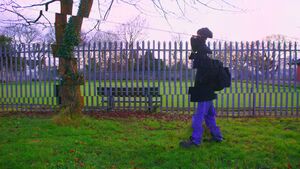 | A Walk in the Park by Chelsea Morgan |
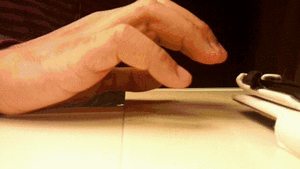 | Scenery Slicing by Subsentience |
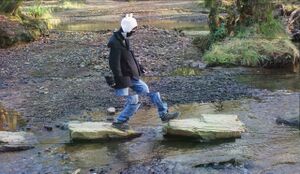 | Finn Jumping Rocks by Chelsea Morgan |
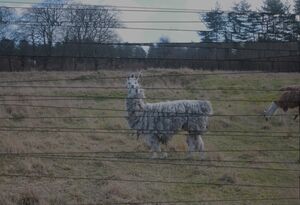 | Llama by Chelsea Morgan |
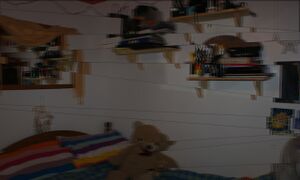 | Dissociative scenery slicing by Chelsea Morgan |
Psychoactive substances
Compounds within our psychoactive substance index which may cause this effect include:
- 1B-LSD
- 1P-ETH-LAD
- 1P-LSD
- 1V-LSD
- 1cP-AL-LAD
- 1cP-LSD
- 1cP-MiPLA
- 2-Fluorodeschloroketamine
- 25B-NBOH
- 25B-NBOMe
- 25C-NBOH
- 25C-NBOMe
- 25E-NBOH
- 25I-NBOH
- 25I-NBOMe
- 2C-B
- 2C-E
- 2C-I
- 2C-P
- 2C-T
- 2C-T-2
- 2C-T-7
- 3-Cl-PCP
- 3-HO-PCE
- 3-HO-PCP
- 3-MeO-PCE
- 3-MeO-PCP
- 4-AcO-DMT
- 4-AcO-MET
- 4-HO-DPT
- 4-HO-MET
- 4-MeO-PCP
- 5-MeO-MiPT
- AL-LAD
- Ayahuasca
- DMT
- DOM
- DPT
- Deschloroketamine
- Dextromethorphan
- Diphenidine
- ETH-LAD
- Efavirenz
- Ephenidine
- Escaline
- GBL
- GHB
- HXE
- Ketamine
- LSA
Experience reports
Annectdotal reports which describe this effect with our experience index include:
- Experience:2 tabs DOB - My DOB Nightmare
- Experience:400mg DXM + 300mg DPH – Bacterial friends
- Experience:Into the Multiverse
- Experience:LSD (230 ug) - An amazing adventure by vikilikepsych
See also
- Responsible use
- Subjective effects index
- Psychedelics - Subjective effects
- Dissociatives - Subjective effects
- Deliriants - Subjective effects
References
- ↑ Papoutsis, Ioannis; Nikolaou, Panagiota; Stefanidou, Maria; Spiliopoulou, Chara; Athanaselis, Sotiris (2014). "25B-NBOMe and its precursor 2C-B: modern trends and hidden dangers". Forensic Toxicology. 33 (1): 1–11. doi:10.1007/s11419-014-0242-9. ISSN 1860-8965.